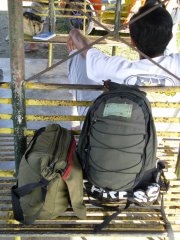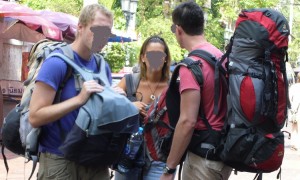If it’s your first time traveling abroad, these pointers will help you have a great experience. Whether yours is a gap year trip or a round-the-world adventure, here are things every first time traveler should know:
1. BE SMART, NOT SCARED.

Bag on right once stolen when my traveling partner fell victim to a common distraction scam while watching our bags. (He tracked down the thief!)
It’s no surprise if your untraveled loved ones naturally fear for your safety in places they know nothing about. Especially when they read wildly-overhyped State Department warnings. Especially when the media exaggerates realities in the name of a good story.
Case in point: I once returned home to news of week-long brutal riots purported to be happening all over the foreign city I’d just come from. I could personally guarantee that 99% of people were going to work, going out to eat, hanging up their laundry, shopping, and cooking dinner, while the news report would have any sane Bangkok-bound person fearing for her life!
Prepare by educating yourself about common cons and learning to manage personal security while traveling. Arm yourself with knowledge, not fear!
2. BE MONEY WISE.

Use multi-colored money to your advantage – create a shortcut by remembering which color you definitely don’t want to part with too often.
Of course there are people everywhere — even in your home country – looking to part you and your cash. You can’t come away from traveling without ever getting stuck paying more than you should, but you can make it a rare occurrence. How? The number-one way travelers leak money is… ignorance!
If you don’t familiarize yourself with prices and memorize the currency, you might as well wear a big “FREE MONEY!” sign. Know the denominations of bills and coins: at the very least know if a bill is worth less or more than $5/5€/ £5. Know the price for a street meal, taxi ride, kilo of fruit, cheap hotel, and a bottle of beer. Never flash more than a day’s worth of your cash stash. When buying an item or service and you’re not sure of the price, ask a local bystander.
Learn to bargain — it’s fun, not a fight. Confidence and a sense of humor will get you farther than a verbal tug-o-war. But above all, memorize that money!
3. BE NICE.
You’d think it goes without saying, but there are plenty of foreign folks taking their frustrations and fears out on the locals – especially in developing nations. Yes, you will go to places full of vendors hoping to earn a living. Yes, it will be annoying to be propositioned by every single one of them. It’s easy to feel like these folks are “ruining your experience.” Bear in mind that you will spend more money on your trip than many of them make in a decade of asking, “Hello Ma’am Taxi? Hello Sir cold drink? Welcome, massage?”
Having constant minor demands on your attention is probably worth the privilege of being from a country whose citizenship and economy allows you to travel the world, don’t you reckon? If you can’t smile and offer a cheerful “No, thank you! No, thank you! No, thank you!” just calmly ignore them. And appreciate the upside: when you do want something, a half-dozen people will be on hand to get it for you!
4. PACK LIGHT!

Don’t let this be you! It’s both mentally and physically exhausting to schlep around this much junk!
I’ll paraphrase Rick Steves: don’t pack for the worst-case scenario. Pack for the best, and buy anything else along the way. You eliminate many options when you’ve got a 50L+ pack on your back and a 25L “daypack” on your front each time you move between places. If this is your first trip, chances are it will be the fastest you’ll ever choose to move on an international-travel journey: all the more reason not to schlep around a bunch of stuff. I promise you won’t need it! Click for a list of what I think you should pack, shouldn’t pack, and why.
5. KNOW WHEN TO SPEND MORE!
Chances are cash is the limiting factor for your journey. It’s easy to get swept away in scrimping on every last yen, rupiah, baht, peso, rupee, and ringit. Sometimes the money you save isn’t worth the price you pay in time, comfort, or sanity.
Case in point: $3 is the price on a hot, stinking, overnight bus in Laos full of animals and B.O. where you’re forced to sit three to a seat. For $6, you can be guaranteed your own seat, air conditioning, and at least a chance at sleep. The former makes for a great one-time story; however, you’ll be truly miserable if those are the conditions you’re traveling in every two to three days.
Example #2: saving $15 on a flight may cost you more than you think. If it requires you to arrive at the airport before local transport starts running, you’ll spend the $15 on a cab ride anyway *and* have to be awake at 4 a.m. after trying to get to sleep while your bunkmates in a 10-bed room come and go or party all night.
6. GO ALONE!
Maybe you’re already setting off on your own. Kudos! If your journey involves the company of your partner, bestie, or some vagabonding stranger you found on the internet, be sure to take a break from them. Great things happen when you’re alone that don’t happen to people in pairs. Once you’ve got the hang of the country, the currency, and the customs, split up for at least a few days. It will force you out of your comfort zone, but embrace it! You’ll be amazed at the richness of experiences available only to solo travelers!
7. PLAN FOR CULTURE SHOCK.

For most westerners, squat toilets are an experience every time – at least at first. But I always end up missing them when I go!
After the exciting honeymoon phase of landing in a new country comes an uncomfortable adjustment period. Suddenly the charm of the gorgeous religious buildings, fantastic architecture, and cobblestone streets don’t outweigh the mangy dogs, strange food, and dirty everything. No matter how many times I leave home, it always seems to take me a week to adjust – especially to a third-world place. Plan on briefly but desperately missing the comforts of home and hating your country of choice. Allow yourself a pamper-day and know that you’ll get so used to it that you’ll miss it when you go home.
8. BE REALISTIC ABOUT MEETING LOCALS.
If you’re traveling using a guide book, it’s unreasonable to expect that you’ll find hundreds of friendly locals with broad smiles and open arms flung wide in eager friendship. The places on the tourist circuit have been grappling for years with the pros and cons of backpack-toting, beer-drinking, culturally insensitive foreigners with money to burn.
(Related: Tourists as World Menaces â—Š Development: A Demi God â—Š Kuta Against My Better Judgement)
Most of the locals you’ll naturally come into contact with are cashiers, waitstaff, clerks, guides, drivers, and vendors. Many of these people will be fun, friendly, and treat you like a person first. Others will treat you according to a stereotype. But let me ask you: are your feelings primarily kind and gregarious toward people with exponentially more money than you’ll ever have? Didn’t think so. Try not to be too disappointed when encountering local folks who don’t instantly like and want to befriend you.
And of course, if you’re going to get scammed, the best way to do it is be naive about locals you meet in heavily touristed areas. The aggressively friendly ones rarely have your best interests in mind.
9. MASTER TRANSPORTATION.
Taxis, buses, and city rail will probably account for the largest number of your journeys. If you’ve used these modes rarely or never, here are the basics:
A) Taxi — Rates come in three varieties: meter, fixed, and negotiated. The meter adds to a standard base rate as time and distance traveled increase. The fixed rate is generally found at a pick-up point (i.e. airport) and is based on your destination. The negotiated rate is standard practice in some places and in others it’s something scammy meter drivers attempt. Better to ditch these guys and grab a cab that will use the meter if you can.
B) Buses — while only a handful of hardy travelers tackle the labyrinth of city buses, nearly all road warriors use long-distance buses. Like, airplanes, these generally leave from a hub inconveniently located on the outskirts of a city where a huge patch of concrete is more affordable. In larger cities, there are often several hubs each serving different regions beyond the urban sprawl. Except during holidays, tickets can generally be purchased upon arrival at the station. Apropos, you usually shouldn’t waste your money going through an agent unless it’s imperative that you get on a specific bus at a specific time.
C) City rail, subway, mono-rail, tube… this is the closest you’ll get to teleporting across any major city. The maze of platforms, exits, and connecting bridges can be disorienting, so hand-write yourself some directions you can check discreetly. Buy a ticket from either a machine or a person. Ticket price is fixed and based on distance traveled. Scan or insert your ticket to enter the passenger zone; do not lose it! Read the diagrams to ensure you get on a train going toward your stop. Scan or insert your ticket to leave the passenger zone and follow signs to whichever exit is best for your ultimate destination.
D) Air — Wikivoyage’s budget air travel page is an excellent introduction to air travel on a shoestring. Hope you like details!
10. EXPECT TO BE MISUNDERSTOOD.
All desperate hand gestures and mangled translation aside, the traveling life can be a lonely proposition sometimes. The folks back home will think only of the stunning vistas and once-in-a-lifetime experiences. They will know little of the painfully-early mornings, the hours spent bouncing on buses, the dearth of familiar food, the cold showers, or the constant brain-drain of figuring out the next destination, meal, hotel, and bus.
Know that self-doubt, homesickness, and loneliness are traveling companions you can’t avoid. Wait them out: they will go away. And they’ll make you appreciate your other companions: adventure, life-changing experiences, fascinating new friends, and a kind of personal growth you can’t get anywhere else!
♣
RTW Trip Planning has more first-time travel tips, including:
- How to Sleep for Free When You Travel
- The Real Cost of RTW Tickets
- How to Get a Free Backstage Cultural Pass
- 24 Jobs To Do While Traveling the World
Check out 7 Things We Wish We’d Done Differently Before Traveling as you plan your trip.
And for newbies who want more travel perspective, check out 9 Universal Travel Truths.





Twitter Facebook Google+ StumbleUpon Reddit Pinterest